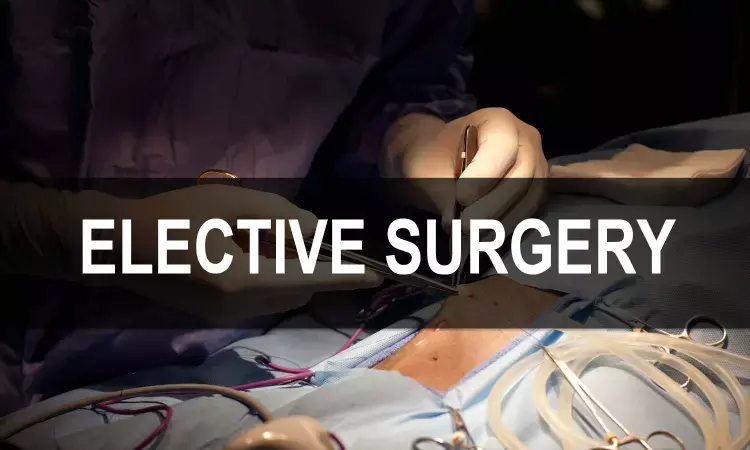- Home
- Medical news & Guidelines
- Anesthesiology
- Cardiology and CTVS
- Critical Care
- Dentistry
- Dermatology
- Diabetes and Endocrinology
- ENT
- Gastroenterology
- Medicine
- Nephrology
- Neurology
- Obstretics-Gynaecology
- Oncology
- Ophthalmology
- Orthopaedics
- Pediatrics-Neonatology
- Psychiatry
- Pulmonology
- Radiology
- Surgery
- Urology
- Laboratory Medicine
- Diet
- Nursing
- Paramedical
- Physiotherapy
- Health news
- Fact Check
- Bone Health Fact Check
- Brain Health Fact Check
- Cancer Related Fact Check
- Child Care Fact Check
- Dental and oral health fact check
- Diabetes and metabolic health fact check
- Diet and Nutrition Fact Check
- Eye and ENT Care Fact Check
- Fitness fact check
- Gut health fact check
- Heart health fact check
- Kidney health fact check
- Medical education fact check
- Men's health fact check
- Respiratory fact check
- Skin and hair care fact check
- Vaccine and Immunization fact check
- Women's health fact check
- AYUSH
- State News
- Andaman and Nicobar Islands
- Andhra Pradesh
- Arunachal Pradesh
- Assam
- Bihar
- Chandigarh
- Chattisgarh
- Dadra and Nagar Haveli
- Daman and Diu
- Delhi
- Goa
- Gujarat
- Haryana
- Himachal Pradesh
- Jammu & Kashmir
- Jharkhand
- Karnataka
- Kerala
- Ladakh
- Lakshadweep
- Madhya Pradesh
- Maharashtra
- Manipur
- Meghalaya
- Mizoram
- Nagaland
- Odisha
- Puducherry
- Punjab
- Rajasthan
- Sikkim
- Tamil Nadu
- Telangana
- Tripura
- Uttar Pradesh
- Uttrakhand
- West Bengal
- Medical Education
- Industry
MTAI seeks government intervention to start elective surgeries at Hospitals

New Delhi: Medical Technology Association of India has sought the government's intervention to ensure elective surgical procedures are resumed in earnest to pre COVID-19 level. This will enable hospitals to re-start their normal operations. The hospitals had to shut down their OPDs due to various government restrictions to control the spread of the COVID19 pandemic, which severely impacted their revenue flow.
Elective surgeries are planned procedures and were mutually postponed by hospitals and patients due to fear of COVID infection. Cases that were postponed included removal of malignant tumours, critical endovascular and peripheral vascular surgeries, chemotherapy, dialysis, hip replacement surgery, and cataract among others. With restrictions being eased out, hospitals have started making provisions for elective surgeries but patients are still reluctant to turn up for procedures due to fear of contracting the infection.
Elective surgeries account for approximately 50% of revenues for hospitals in normal business conditions. Reduced revenues have curtailed hospitals' ability to pay for supplies of pharmaceuticals, diagnostics, and medical devices, thereby severely disrupting the entire healthcare value chain. More than 5 lakh planned surgeries in India have been re-scheduled since the imposition of lockdown.
The fall in revenue of hospitals is creating an unprecedented financial crisis for the medical device sector due to delays in payment. Medical device companies are already dealing with an increase in operational expenses and limited availability of transportation and workers. This is further compounded by additional costs in complying with safety and hygiene standard operating procedures.
"The healthcare sector is in dire need of support to resume services to the optimal level. One quick measure in the current circumstances is the resumption of elective procedures at the earliest. Hospitals need to work in tandem with the government to start elective surgeries without compromising their capabilities to handle COVID-19 cases. The creation of a clear communication module is equally important in order to allay any fears in the minds of patients," Medical Technology Association of India, Director, Mr. Sanjay Bhutani said.
Governments of many countries including the US, Australia, Japan, Canada, and Singapore have allowed elective surgeries after balancing the community's needs against the risk of infection of COVID19. The measures that they have put in place include:
· Adequate provisions to handle and treat COVID-19 cases in isolation.
· Adequate supply of PPEs, medications, ICU beds, and availability of human resources
· Prioritization of surgeries based on the severity of illness.
· Regular screening of nonCOVID-19 patients and staff attending to them.
· Strict sanitation policies in both COVID-19 and nonCOVID-19 treatment areas.
In addition to the above, hospitals in India should also devise a module to communicate all the safety and screening measures they have taken to patients to give them the required confidence to appear for treatment.
Read also: NIPERs focuses on research, 3D products to fight COVID19
Ruchika Sharma joined Medical Dialogue as an Correspondent for the Business Section in 2019. She covers all the updates in the Pharmaceutical field, Policy, Insurance, Business Healthcare, Medical News, Health News, Pharma News, Healthcare and Investment. She has completed her B.Com from Delhi University and then pursued postgraduation in M.Com. She can be contacted at editorial@medicaldialogues.in Contact no. 011-43720751


